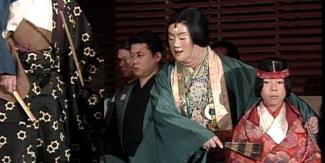Event

How might dramatic portrayals of slavery help us rethink the relation between subjectivity, labor, and performance? I consider such portrayals through readings of the writings of master Noh actor, playwright, and theorist Zeami Motokiyo (1363–1443), and the play Jinen Koji, which Zeami revised. The play’s plot is simple: Filial girl sells herself into slavery to pay for parents’ funeral rites. Daring Buddhist preacher dances to purchase her freedom. But what might these coupled exchanges say about calibrated gestures’ capacity to reshape how human life was valued within medieval Japan? What types of physical exertions, economic transactions, affects, and disidentifications does the figure of the slave mobilize—and toward what ends? Citing artist William Pope L.’s notion of “showing up to withhold” alongside other concepts of black embodiment and fugitivity, I argue that Zeami deploys spectacles of gestural economy to question economies of enslavement, rewrite histories of dispossession, and pose alternatives to performers’ dehumanization.
Reginald Jackson is Associate Professor of premodern Japanese literature and performance at the University of Michigan. His research interests include medieval calligraphy and illustrated handscrolls, Noh dance-drama, contemporary Japanese choreography, queer theory, and critical race theory. He is the author of Textures of Mourning: Calligraphy, Mortality, and the Tale of Genji Scrolls (University of Michigan Press, 2018), and A Proximate Remove: Queering Intimacy and Loss in The Tale of Genji (University of California Press, forthcoming 2021). His newest research project examines the relationship between slavery and performance in premodern Japan, drawing from black studies and Japanese studies to read beyond their respective disciplinary blind spots. His writing appears in Harvard Journal of Asiatic Studies, TDR: The Drama Review, Theater Survey, boundary 2, Asian Theatre Journal, and Women and Performance: a Journal of Feminist Theory. His scholarly pursuits are enriched by a devotion to illustration, luthiery, and playing electric guitar.
Co-sponsored by Faculty Working Group on Reading the Material Text in Japan,
Penn Forum on Japan, and Saunders Council on Buddhist Studies